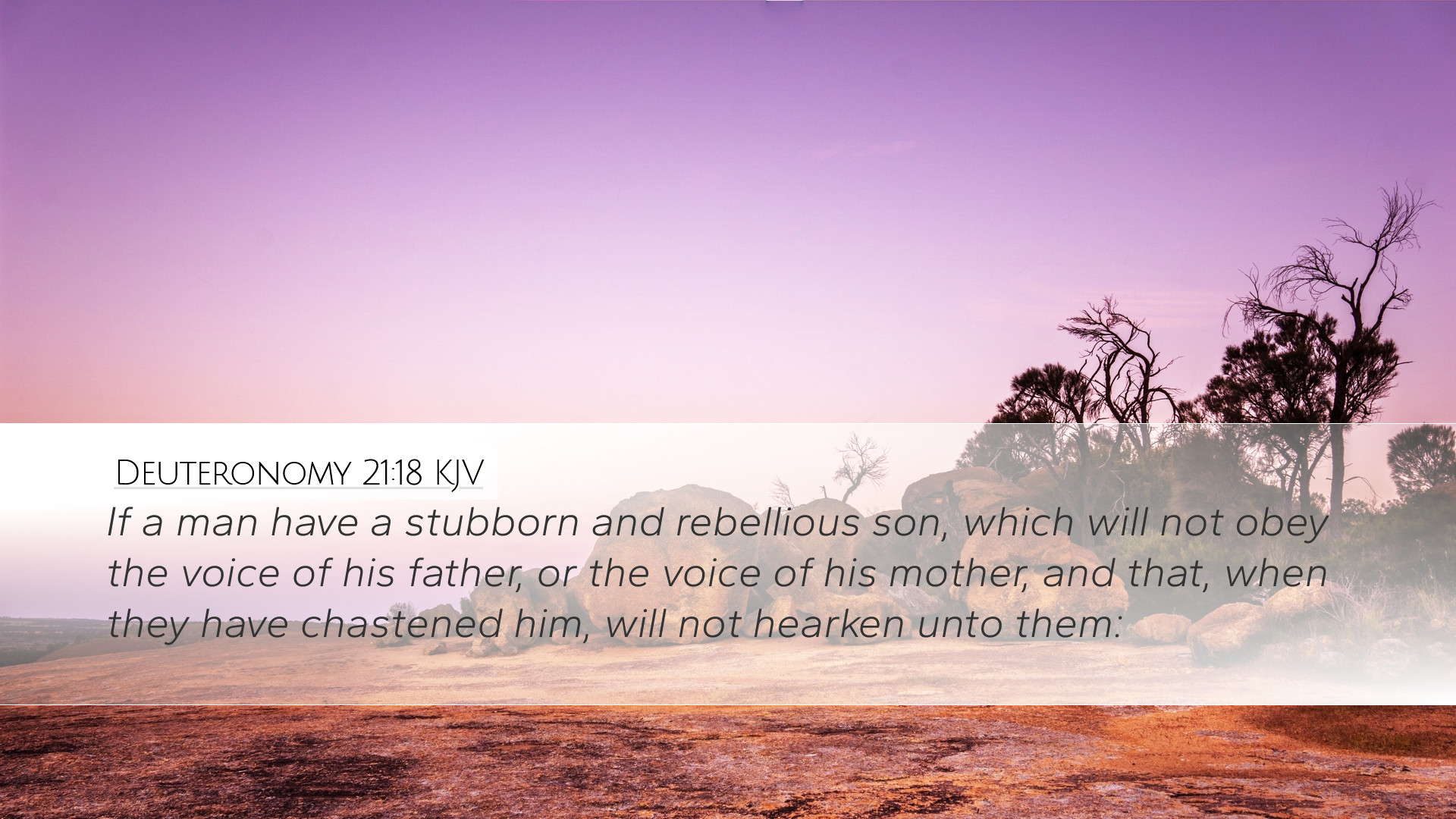Commentary on Deuteronomy 21:18
Verse: "If a man has a stubborn and rebellious son who will not obey the voice of his father or the voice of his mother, and though they discipline him, will not listen to them," (Deuteronomy 21:18, ESV).
Introduction
Deuteronomy 21:18 presents a critical and challenging directive concerning familial relationships and societal order within the Israelite community. This verse introduces the concept of accountability within family structures, focusing on the actions of a rebellious son. The gravity of the circumstances surrounding this text necessitates a thorough examination of its implications in both the historical and contemporary contexts.
Historical Context
This verse is situated within the legal code provided to the Israelites as they prepared to enter the Promised Land. The laws outlined in Deuteronomy serve as a framework for communal living, drawing boundaries for acceptable behavior and governance. Matthew Henry notes that the Israelites were required to uphold not only their individual responsibilities but also their commitment to communal integrity.
Exegesis of the Text
Albert Barnes emphasizes that the rebellious son's conduct signifies a breach of the fifth commandment, which commands respect towards one's parents. This disobedience is more than mere childhood rebellion; it connotes a profound disregard for the moral order established by God.
- Stubbornness and Rebellion: The terms "stubborn" and "rebellious" suggest a deliberate choice to oppose authority. Adam Clarke highlights that this behavior is not merely a phase but indicates a deeper moral failing.
- Discipline and Consequences: The father and mother’s attempts to discipline the son demonstrate the importance of parental authority in shaping character. Despite these efforts, the son's refusal to heed their guidance leads to dire consequences, illustrating the limits of parental influence when faced with a hardened heart.
Theological Implications
From a theological standpoint, this passage raises significant questions regarding justice, mercy, and the role of community in witnessing and responding to sin. Matthew Henry posits that this law serves as a deterrent, aiming to maintain societal order by addressing egregious behavior that threatens family and communal stability.
Justice and Community Responsibility
There is an underlying principle that community members bear responsibility for maintaining moral integrity. Barnes elucidates the necessity of invoking corporate judgment when individual behavior endangers the moral fabric of society. Thus, this passage reflects a collective ethical stance—individual failings cannot be neglected without consequence.
Parental Authority
In examining parental authority, Clarke remarks that parents are endowed with the responsibility to train their children in righteous ways. The bluntness of the punishment for the rebellious son underscores the need for a serious approach to parenting, where proper discipline is integral to moral upbringing.
Application for the Modern Reader
While the cultural context of Deuteronomy differs significantly from contemporary society, the underlying principles remain applicable. Pastors and theologians can draw parallels between the ancient Israelite community and today’s families, where rebellion can manifest in various forms.
- Encouragement of Dialogue: The need for open channels of communication between parents and children is critical. This passage serves as a reminder that dialogue should be encouraged to foster understanding and obedience.
- Community Support Systems: Churches and communities should take a proactive role in supporting families. Clarke suggests that congregational frameworks can provide guidance and intervention for families dealing with issues of rebellion.
Conclusion
Deuteronomy 21:18 offers a sobering reflection on the dynamics of familial relationships and the weighty implications of rebellion. It compels its audience to examine their roles and responsibilities within families and communities. Through this text, practitioners in ministry, scholars, and students alike are encouraged to reflect upon the necessity of upholding moral standards that protect both individuals and the community from the potential ravages of dishonor and rebellion.


